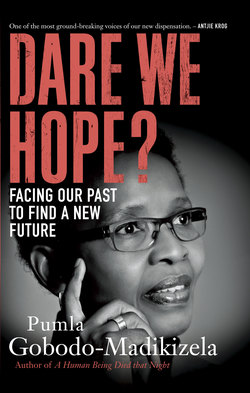Читать книгу Dare We Hope? - Pumla Gobodo-Madikizela - Страница 14
На сайте Литреса книга снята с продажи.
8. The language of forgiveness
ОглавлениеSunday Times, 17 July 2005
In June 2005, I had the honour of delivering a speech alongside a child survivor of the Holocaust at an event entitled ‘60 Years Later – Children of War Remember’, hosted by the Kulturwissenschaftliches Institut in Germany. It brought together both victims of the Holocaust and family members of Nazi perpetrators. The depth and openness of mutual engagement illuminated for me the path that South Africa as a nation has yet to walk.
LAST MONTH I was invited to deliver a speech entitled ‘Forgiveness as an issue of collective memory’ at a public event organised by the Kulturwissenschaftliches Institut in Essen, Germany. The second lecture was entitled ‘Auschwitz, Mengele, me and forgiveness’, and its author, Eva Mozes Kor, was a child survivor of Dr Josef Mengele’s so-called ‘twin experiments’ in the Nazi concentration camp of Auschwitz.
Some may wonder if the language of forgiveness is appropriate in discussions of historical memory in Germany, perhaps because of the word’s erroneous association with forgetting. Far from being driven by a desire to forget, the men and women I met during my recent trip to Germany were fully confronting the past. They are the generation whose parents and relatives were the ‘willing executioners’ – as Daniel Goldhagen refers to Nazi-era German society – in Hitler’s ‘Final Solution’.
At the end of the war, the war generation was in denial, and wanted to forget the past and their role therein. When the post-war generation came of age in the 1960s and 1970s, however, they rebelled against their parents’ denial of responsibility for the Holocaust. They self-righteously attacked their parents’ generation for bringing Hitler to power. At the same time, they continued to enjoy the many privileges of an economically prosperous Germany.
Now in their mature years, having raised their own children, with most of the war generation beyond the grave, many Germans over the age of 50 are beginning to confront memories that they have shared only privately. The post-war generation in Germany is faced with the problem of guilt by association, and wants to deal with it not with the denial and veil of silence that followed the war. They want to confront their shame and guilt, embrace it, and transcend it. Dialogue about forgiveness and/or reconciliation may be the vehicle to reach that transcendence.
Unlike Germans, we South Africans had an opportunity, through the Truth and Reconciliation Commission (TRC) process, for public dialogue about our own past that created victims and perpetrators, beneficiaries and bystanders. In spite of the TRC process of public dialogue, however, and hardly a decade since the TRC concluded its work, we seem to be avoiding any reference to South Africa’s horrific past and its wide-ranging consequences. We have become skilled at attacking one another – black and white – in private and in public. Whites accuse blacks of benefiting from post-apartheid privilege; blacks accuse whites of attitudes that serve to perpetuate the racism of the past. What is starkly missing is dialogue that could help us to understand the forces of the past.
South Africans can learn from the introspection of the generation of Germans who are courageously facing their country’s history 60 years after Nazi atrocities in which they did not participate, and which they did not witness. The past, as the German writer Christa Wolf informs us, is not dead; it has not even passed.
We must talk about our difficult past, and how it continues to define our relationships in subtle ways. Through the dialogue about our past, we must also find a way of celebrating humanity. The heart of forgiveness does not necessarily lie in loving those around us (it definitely does not lie in hating them either). The spirit of forgiveness lies in the search – not for the things that separate us – but for something common among us as fellow human beings, the compassion and empathy that binds our human identity.
